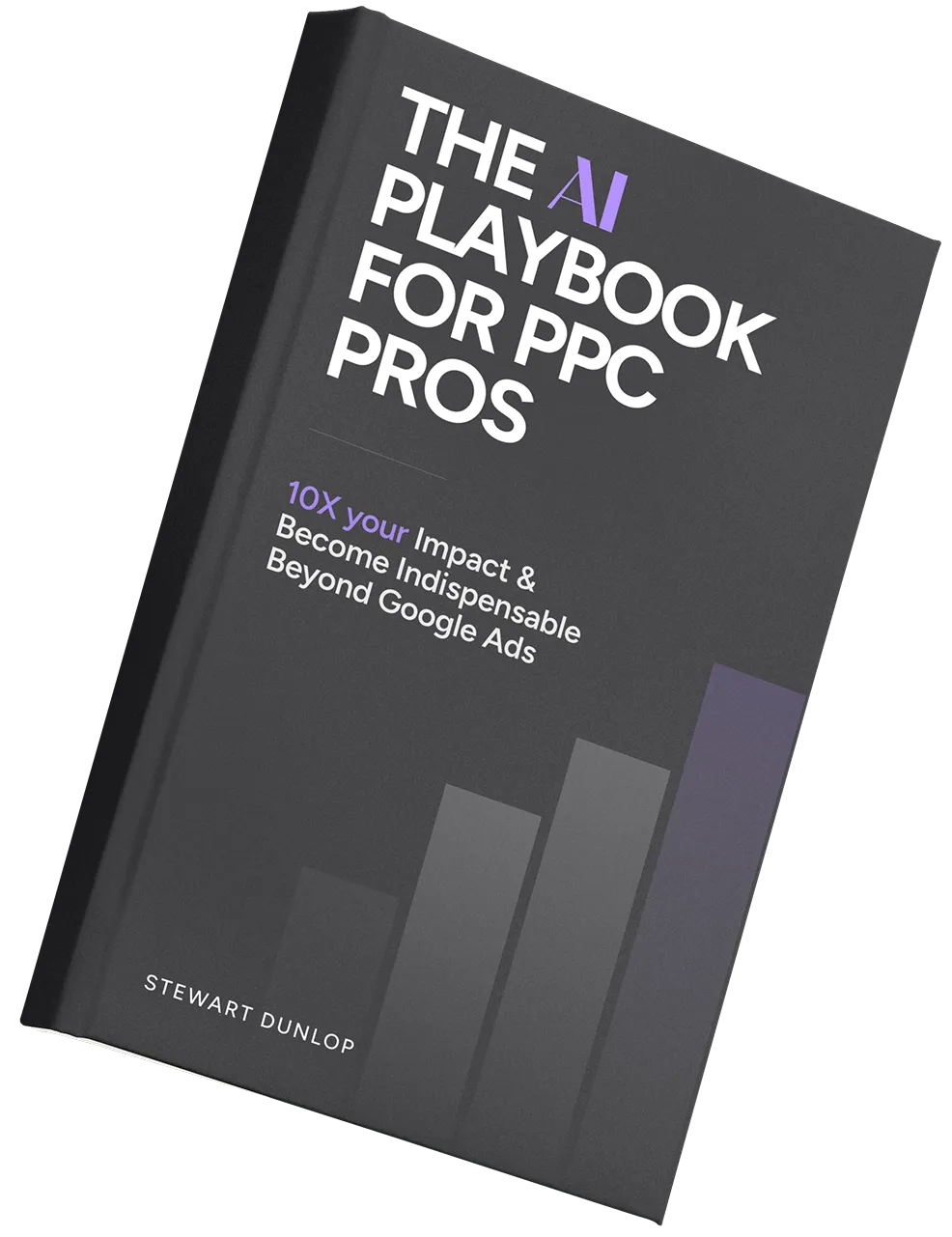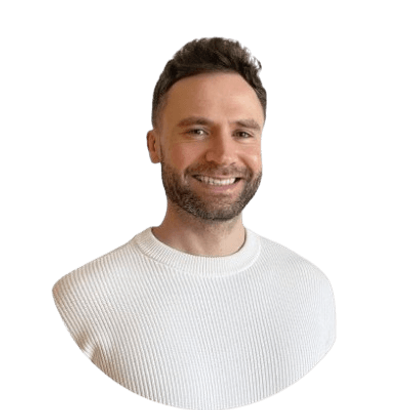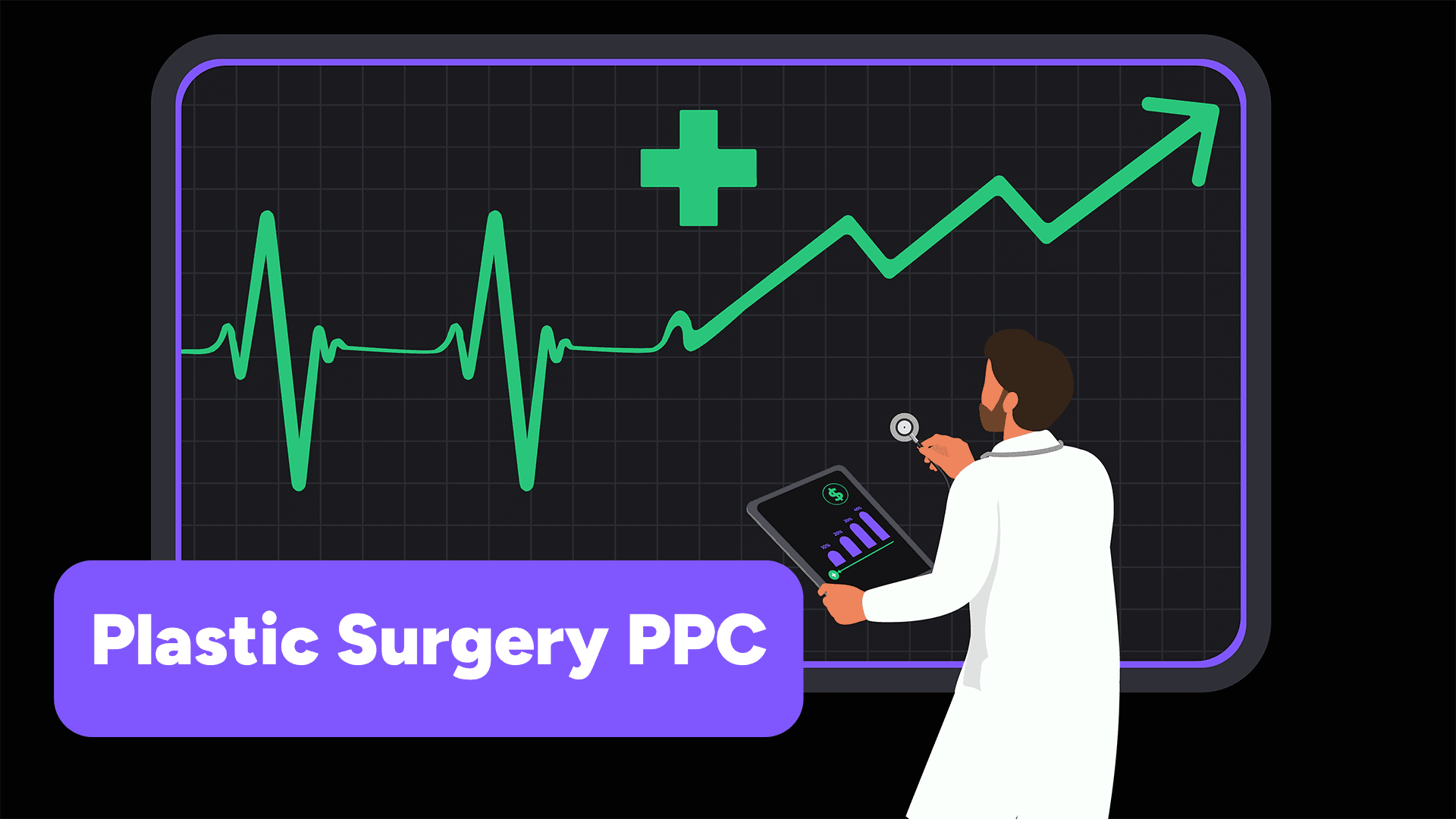
Imagine a steady stream of consultation requests for your plastic surgery business - that's what PPC advertising can bring to the table.
Picture your calendar filled with patients seeking your breast augmentation, liposuction, or facial rejuvenation expertise.
In a competitive field like plastic surgery, PPC allows you to reach your ideal patients right when they search for your services.
The numbers speak for themselves - 28% of people visit a practice's website advertised in a paid ad.
In this article, we explain the benefits of PPC for plastic surgeons and how to use it effectively.
What Is Plastic Surgery PPC?
Pay-per-click (PPC) advertising offers cosmetic surgeons a way to buy top positions in search engine results pages (SERPs).
Since many people turn to search engines to research procedures and find a provider, this targeted approach makes it a powerful tool for attracting potential patients.
For example, type in "plastic surgeon New York City", and you'll see ads from individual surgeons competing for your business.
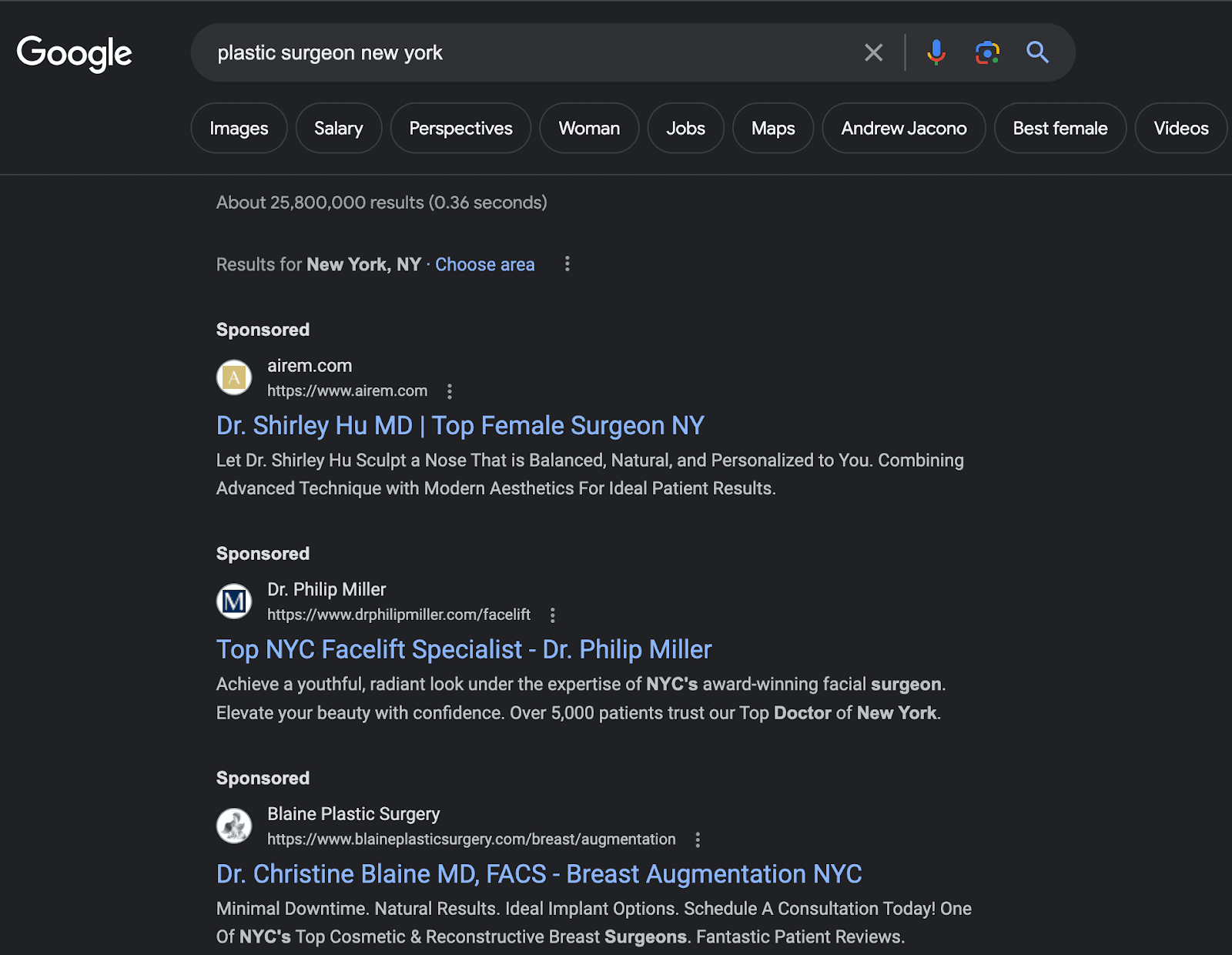
The best part? You’ll only pay when a potential patient clicks on your ad.
This type of advertising is beneficial for plastic surgeons because it targets individuals actively seeking cosmetic procedures, potentially leading to higher engagement and conversion rates.
PPC advertising can be an effective way for plastic surgeons to:
👉 Attract new patients seeking both surgical and nonsurgical procedures
👉 Increase online visibility for their practice
👉 Promote specific procedures or areas of expertise
👉 Establish themselves as thought leaders in their local area
Additional benefits of PPC include:
💰 Cost-effective way to reach highly targeted potential patients
💻 Drive consultations and procedure bookings
📊 Measure and analyze performance to optimize campaigns and ROI
How Does Plastic Surgery PPC Advertising Work?
Keywords are the lifeblood of any PPC campaign. These specific words and phrases are what people type into search engines like Google when looking for plastic surgery procedures.
Here are some examples of keywords someone may search with when looking for a plastic surgeon:
🔎"Breast augmentation Columbus"
🔎"tummy tuck specialist"
🔎"Best rhinoplasty surgeon Ohio"
Highly relevant keywords are essential for successful plastic surgery PPC (or any PPC, for that matter!). These keywords ensure your ads are seen by potential patients who are actively searching for procedures your practice offers.
By choosing the most relevant ones, your sponsored ads will appear at the top of search results.
Set a budget and bid on keywords
Next, you must determine your PPC advertising budget. This includes deciding how much you're willing to pay for each click on your ads (this is called your "bid").
Whenever someone searches for a relevant keyword like "breast augmentation [city]," Google runs a quick auction to determine which ads get the top spots.
Here are the factors that Google considers:
➡️Bid amount: How much a surgeon will pay per click.
➡️Ad relevance: How closely does the ad match the search (e.g., does the ad headline and description mention "breast augmentation" specifically?)
➡️Ad quality: Is the plastic surgery PPC ad well-written, highlights the surgeon's expertise, and uses a clear call to action?
➡️Landing page: Does the page provide detailed information, feature before/after photos, and make it easy for people to inquire?
While bidding plays a role in ad placement, it's not the only factor. A highly relevant ad and exceptional landing page experience can still secure top positions, even with a lower bid.
What determines keyword costs?
The cost of each keyword depends on several factors:
➡️Quality score: Google assigns a quality score to your ads, reflecting their relevance and expected user experience. It's a measurement of how well your ad and landing page answer the searcher's query. A strong quality score can help you secure better ad positions at a lower cost.
➡️Competition: Highly sought-after keywords will naturally be more expensive. If multiple plastic surgeons are vying for the same terms (like "plastic surgeon near me"), the cost per click (CPC) goes up due to demand.
➡️Search intent: Keywords demonstrating a clear interest in booking a consultation ("plastic surgeon near me") generally cost more than informational searches ("how much does a nose job cost?").
Example:
Let's use a keyword tool like Ahrefs to see this in action:
"Plastic surgeon near me" This high-intent keyword has a $3.00 CPC and a global search volume of 19K. This reflects strong competition and the likelihood that these searchers are ready to book a consultation.

"How much does a nose job cost?" This keyword indicates the user is at the research stage and is not quite ready to commit to surgery. It has a lower CPC of $0.90 and a smaller search volume.

💡Additional considerations
- Location: Keywords may cost more in densely populated areas where competition among surgeons is higher.
- Long-tail keywords: Targeting specific procedures or locations with longer phrases (e.g., "best facelift surgeon in San Diego") can sometimes be more cost-effective due to decreased competition.
How Does PPC Advertising Work in the Plastic Surgery Industry?
Now that you understand the basics of PPC for plastic surgeons, let's look at the specific considerations for cosmetic surgery practices.
Google Ads has guidelines to ensure that healthcare-related advertising is accurate, responsible, and respects patient privacy.
Key things to know:
✔️Accuracy and trustworthiness: Avoid exaggerated claims or implying guaranteed results in your search ads. Clear, factual information builds trust. Highlight your expertise, but always frame it realistically.
✔️Landing page matters: Your ad must lead to a landing page that aligns with the promoted procedure or service. Before/after photos, testimonials (with permission), and easy consultation booking all enhance the page's effectiveness.
✔️Privacy restrictions: You cannot target potential patients directly based on a specific procedure they might search for (e.g., "breast augmentation"). Google's policy prohibits personalized advertising directly tied to health conditions.
✔️No remarketing ads: You CAN retarget people who have visited your website with ads about your practice in general. But you can't single out specific procedures they may have researched.
🧠 What Is Retargeting?
Sometimes called remarketing, retargeting is a way of showing display ads to people who visited your site but didn’t commit to anything. When someone visits your site, it leaves a piece of code called a cookie on their browser. Ad platforms use these cookies to decide what ads to show users.
✔️Navigating image guidelines: Google is sensitive to nudity and suggestive content. Plastic surgery often involves visual results. Choose ad images carefully to avoid being penalized.
✔️Medication restrictions: If your website promotes cosmetic fillers like Botox, Google Ads won't allow you to direct traffic there. Your ads and landing pages need to promote your broader services (facial rejuvenation, nonsurgical treatments, etc.)
ℹ️ For the most up-to-date details, always refer directly to Google's policies:
➡️Google Ads Policy on Personalized Advertising
🧠 Need Help with Your Plastic Surgery PPC Campaigns?
Google's policies aim to protect users. While plastic surgeons are still allowed to utilize PPC, there are some restrictions. A well-crafted PPC strategy could still be highly effective in reaching potential patients interested in your services.
Don't let Google's policies limit your patient reach. PPC.io specializes in plastic surgery PPC services to help you attract qualified leads for cosmetic procedures. Contact us to see how.
How to Get Started with Plastic Surgeon PPC Campaigns
Whatever your medical specialty, a well-crafted plastic surgery PPC campaign can put your services in front of the right audience at the right time.
This section will help you set up your ad campaign and show you the steps to take when advertising your plastic surgery practice.
1️⃣Lay the groundwork
Before launching any PPC campaign, laying a solid foundation is key. Here's how to get started:
Choose your platform
There are many different types of PPC advertising formats and platforms available. Here's a breakdown of the primary options and how they can benefit plastic surgeons:
Search ads
➡️Google Ads: The top choice for reaching people actively searching for procedures, surgeons, or practices in your area.
➡️Bing Ads: Can be a useful supplement, potentially offering lower costs in certain niches or locations.
Display ads
The Google Display Network features visually engaging ads (images, videos) that appear on websites and apps. Ideal for building brand awareness and retargeting people who have visited your website.
Social media ads
Meta Ads (Facebook/Instagram) use visually appealing ads to target based on demographics, interests ("beauty," "self-improvement"), and even past online behaviors.
⚠️Note: From here on, we'll focus on Google Ads, the most popular PPC platform.
Define your goals
The next step is to be specific about what you want your PPC ads to achieve.
Do you want to:
- Drive more consultations?
- Increase awareness in your local area?
- Promote a particular procedure or set of procedures?
- Get more visitors to your website?
2️⃣Set your budget
Example:
Let's use a keyword tool like Ahrefs to see this in action:
"Plastic surgeon near me" This high-intent keyword has a $3.00 CPC and a global search volume of 19K. This reflects strong competition and the likelihood that these searchers are ready to book a consultation.
3️⃣Keyword research
- Location: Keywords may cost more in densely populated areas where competition among surgeons is higher.
- Long-tail keywords: Targeting specific procedures or locations with longer phrases (e.g., "best facelift surgeon in San Diego") can sometimes be more cost-effective due to decreased competition.
Brainstorm
Key things to know:
✔️Accuracy and trustworthiness: Avoid exaggerated claims or implying guaranteed results in your search ads. Clear, factual information builds trust. Highlight your expertise, but always frame it realistically.
✔️Landing page matters: Your ad must lead to a landing page that aligns with the promoted procedure or service. Before/after photos, testimonials (with permission), and easy consultation booking all enhance the page's effectiveness.
✔️Privacy restrictions: You cannot target potential patients directly based on a specific procedure they might search for (e.g., "breast augmentation"). Google's policy prohibits personalized advertising directly tied to health conditions.
✔️No remarketing ads: You CAN retarget people who have visited your website with ads about your practice in general. But you can't single out specific procedures they may have researched.
Use a keyword tool
Whatever your medical specialty, a well-crafted plastic surgery PPC campaign can put your services in front of the right audience at the right time.
This section will help you set up your ad campaign and show you the steps to take when advertising your plastic surgery practice.
Here is what to take into consideration when doing keyword research:
🏆Search volume: How often a term is searched per month. Higher volume usually means greater competition.
🏆Relevance: Choose keywords that closely match a potential patient's search.
🏆Intent: Prioritize keywords that suggest the searcher is close to making a decision. For example:
- "[procedure] surgeon in [city]" (e.g., "breast augmentation surgeon in Miami")
- "Best [procedure] specialist [city]" (e.g., "Best rhinoplasty specialist Los Angeles")
- "[Procedure] consultation near me" (e.g., "Tummy tuck consultation near me")
🏆Competition: Indicates how many other advertisers use the same keyword (rated low, medium, high).
🏆Cost per click (CPC): An estimated cost should someone click your ad. CPCs tend to be higher for competitive keywords.
There are many different types of PPC advertising formats and platforms available. Here's a breakdown of the primary options and how they can benefit plastic surgeons:

The Google Display Network features visually engaging ads (images, videos) that appear on websites and apps. Ideal for building brand awareness and retargeting people who have visited your website.

ℹ️ Key Points
- Balance is key: Use a mix of high-volume, competitive keywords with more niche, long-tail options.
- Negative keywords are important: Identify words you don't want to appear for (e.g., "cheap plastic surgery," "plastic surgery gone wrong").
4️⃣Optimize your landing pages
As we mentioned above, keywords are the cornerstone of PPC advertising. In order to target the right people, you will need to find the right keyword terms. In our experience, here are the best ways to approach keyword research:
Match the message
The first step is to start broad. List your practice's main procedures (e.g., breast augmentation, rhinoplasty, liposuction, etc.).
Expand your list with variations on procedures ("mini tummy tuck" vs. "full tummy tuck") and relevant specialties ("facial rejuvenation specialist," "mommy makeover surgeon").
Next, note the cities, towns, or regions you primarily serve—for example, that you are based in Florida and have practices in Miami, Boca Raton, or the greater Fort Lauderdale area.
Frictionless experience
Compare this to “laser liposuction cost.” People searching this term are likely comparing options.
They're deeper in their decision process. Fewer searches (3.1K) and a lower CPC ($1.60) present an opportunity. Ads highlighting pricing or special offers could be effective here.
Provide essential information
The landing page should be a seamless continuation of the ad's promise. If your ad highlights breast augmentation expertise, the page should focus on that, not a general list of services.
Strong calls to action
Clearly answer the questions a potential patient likely has:
- Your credentials and experience
- Details about the procedure(s) in question
- Pricing information (if possible) or how to get a quote
- Testimonials and before/after photos to build trust
💡Key Takeaway: A poorly designed or irrelevant landing page will waste your ad spend. Invest time in creating pages that match searcher intent and make taking the next step easy.
Here is an example of a great landing page.
Let's use one of our examples from earlier: “laser liposuction”

✔️Clearly communicates the service offered: The page aligns directly with potential ad content, establishing a consistent message.
✔️Targets a specific audience: The page focuses on problem areas (stomach, hips, etc.) that resonate with people seeking body contouring solutions.
✔️Highlights benefits: The page consistently emphasizes the procedure's advantages, such as permanent fat removal and minimal scarring.
✔️Offers a free consultation: The page offers a free consultation with prominent contact details, encouraging engagement and answering questions.
✔️Social proof: The landing page includes patient testimonials and realistic before and after imagery, bolstering credibility.
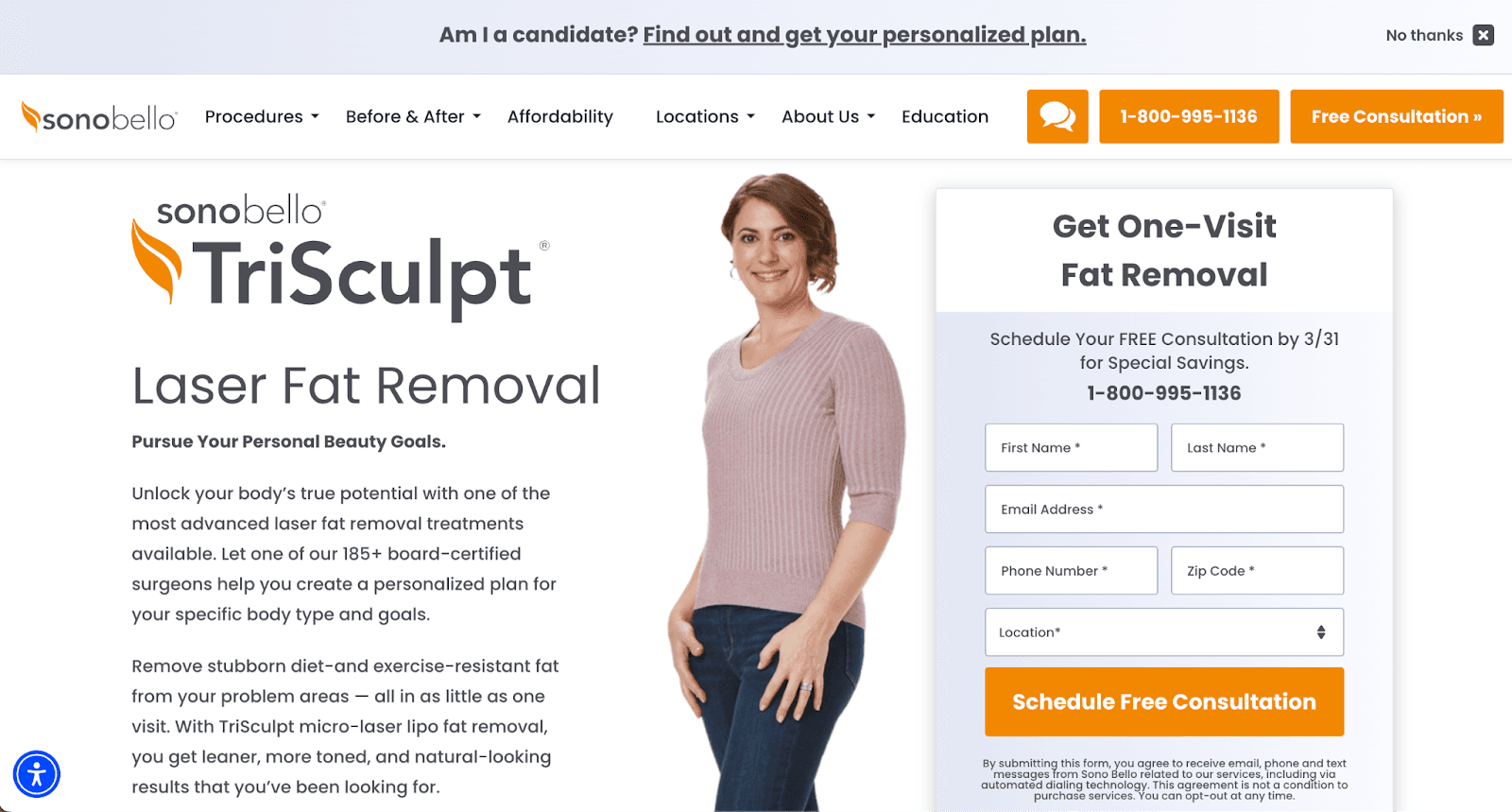
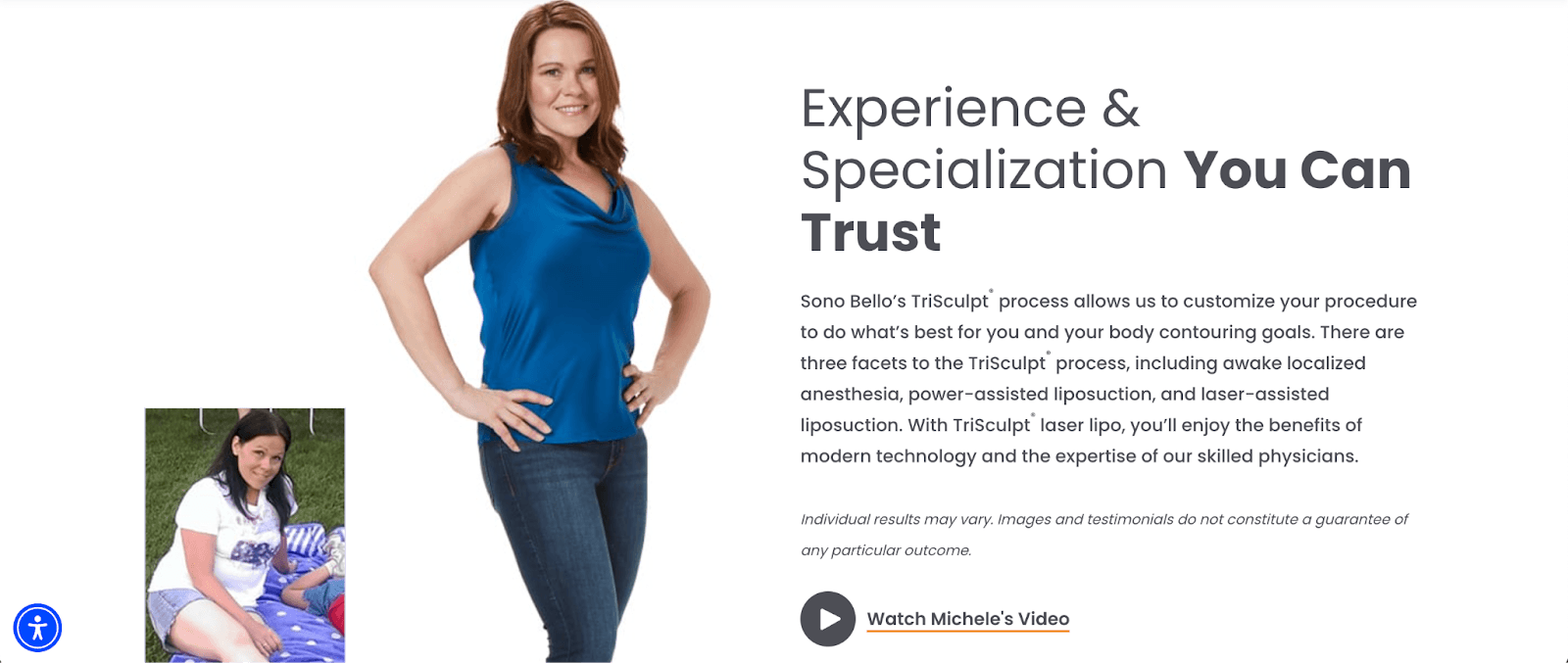
➡️Highlight expertise: Phrases like "board-certified" or "mommy makeover specialist" build trust quickly.
➡️Emotion appeals: Tap into desires for greater confidence, feeling youthful, etc.
➡️Test pricing: If feasible, try ads like: "Breast Augmentation Consultations from $XX" to attract those with a budget.
5️⃣ Create Your Ad Copy and Design
💡Here is Google’s official guide on how to set up a Google Ads account.
Here’s why it works:
✅Procedure focus: Specifying liposuction matches the intent of potential searchers.
✅Benefit-driven: "The body you want" taps into emotional desires, and "minimal downtime" addresses a common concern.
✅Location-specific: Attracts the right audience in Atlanta.
✅Clear and concise: The description conveys the message without unnecessary words.
✅Strong CTA: "Free" is enticing, and "Now" creates urgency.
🎯Advanced targeting options:
➡️Topics: Let your display and video ads appear on websites about plastic surgery, beauty, or specific procedures.
➡️Remarketing (data segments): Reconnect with potential patients who've already visited your website with tailored follow-up ads.
➡️Custom audiences: Create highly focused audiences combining the above factors. For example, women aged 25-45 within your location, interested in mommy makeovers.
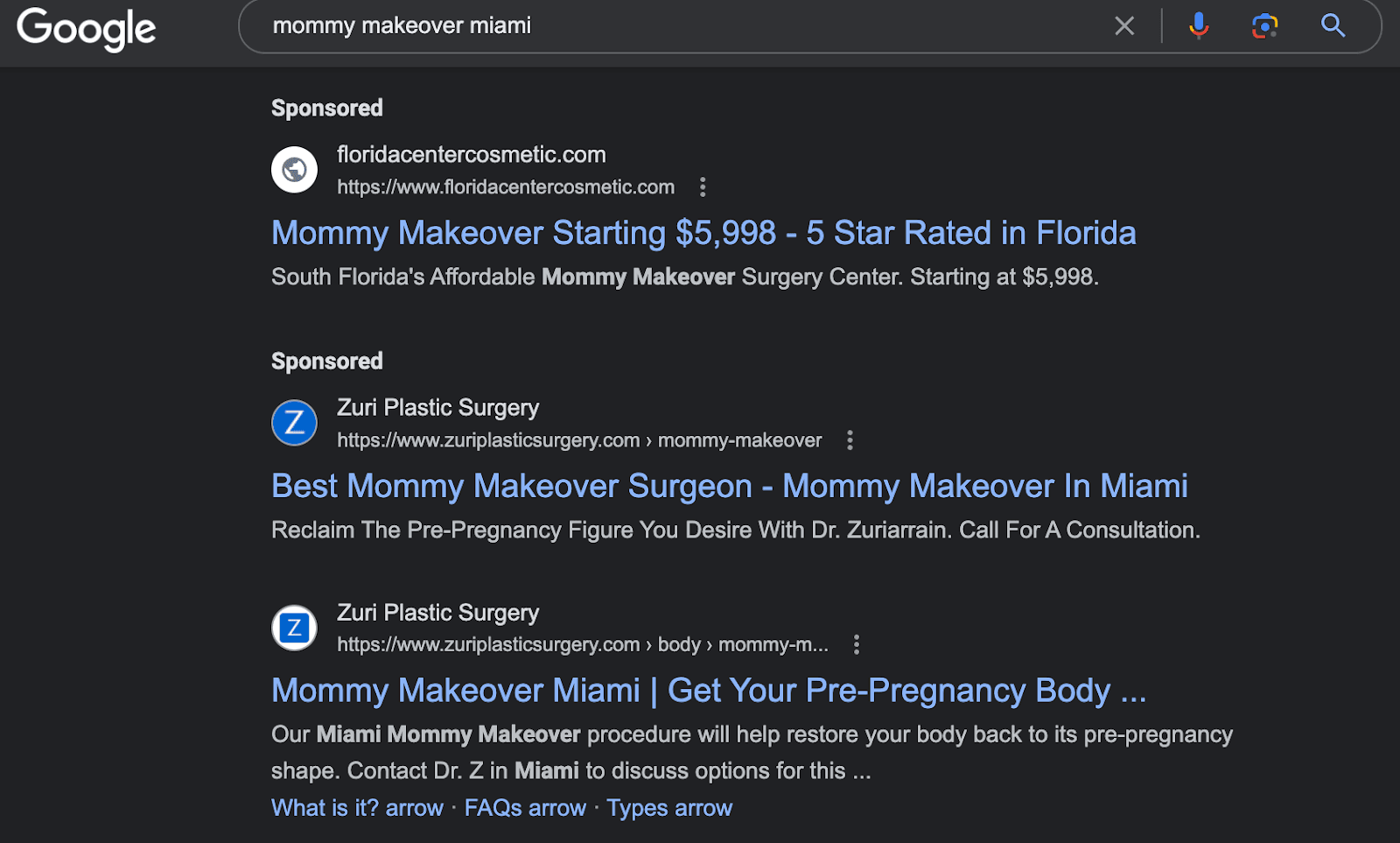
Additional tips for plastic surgeons:
Within each campaign, create ad groups. Each ad group should focus on a very specific set of keywords.
For instance, within your "Breast Augmentation" campaign, you might have ad groups for:
Ad Group 1: [breast augmentation + your city], [breast implants + your city]
Ad Group 2: "best breast implant types [current year]", "breast lift vs. augmentation"
Ad Group 3: "breast augmentation recovery," "breast augmentation cost [your city]"
6️⃣Create your Google Ads account
This automated bidding strategy aims to generate as many qualified leads (consultations, inquiries) as possible within your budget.
Here is what you will need:
✅Business info: Your practice’s name, website, and contact details.
✅Campaign basics: A starting budget and an idea of the keywords you want to use.
✅Payment method: A credit card to pay for clicks on your ads.
Setting up conversion tracking is essential for understanding the true effectiveness of your PPC campaigns.
7️⃣Set Up Your Target Audience in Google Ads
Regularly reviewing your PPC campaign performance is key to making data-driven decisions.
Pay close attention to metrics like:
📊Click-through rate (CTR): How often people click your ad after seeing it. A good CTR indicates your ad resonates with your target audience.
📊Cost per click (CPC): CPC measures how much you pay for each click. This varies greatly based on competition and your bidding strategy.
📊Conversion rate: What percentage of clicks turn into leads? This is the ultimate measure of whether your ads and landing pages work.
Google Ads provides the raw data, but it's up to you to spot patterns and potential areas for improvement. Do certain procedures, locations, or times of day generate better results? Use these insights to inform strategy refinements.
Here is a breakdown of the most relevant targeting options:
🎯Primary targeting options:
- Location: Focus on cities, regions, or even specific zip codes where you practice. Radius targeting is perfect for capturing "near me" searches.
- Demographics: Target based on age, gender, and potentially income level, depending on your ideal patient profile.
- Interests and behaviors: Reach people actively searching for information on plastic surgery procedures or related topics.
- Devices: Prioritize ads on desktops, smartphones, or tablets based on your potential patients’ preferences.
As a surgeon focused on transformative results, mastering the complexities of PPC advertising can be a major distraction. That's why partnering with a specialized agency makes sense.
By understanding the unique landscape of plastic surgery marketing, we help you avoid costly mistakes that waste your budget and make you miss out on potential patients.
⚠️Note: Be mindful of privacy regulations when using remarketing or custom audiences with health-related data. We discussed this in detail above.
8️⃣Set Up Campaign Structure
A well-structured PPC campaign makes it easier to reach your target patients, analyze results, and optimize over time. Here's how to create a logical framework:
Campaigns
Think of campaigns as the big-picture categories for your ads.
Consider dividing them by:
- Cosmetic surgery procedures like breast augmentation, rhinoplasty, liposuction, etc.
- Nonsurgical treatments like Botox, fillers, laser treatments, and chemical peels.
- Patient education: Informative campaigns on procedures, expectations, and recovery.
- Special offers: Promote discounts, packages, or seasonal deals to drive bookings.
Ad groups
Within each campaign, create ad groups. Each ad group should focus on a very specific set of keywords.
For instance, within your "Breast Augmentation" campaign, you might have ad groups for:
Ad Group 1: [breast augmentation + your city], [breast implants + your city]
Ad Group 2: "best breast implant types [current year]", "breast lift vs. augmentation"
Ad Group 3: "breast augmentation recovery," "breast augmentation cost [your city]"
9️⃣Place a bid
Next, you need to place a bid in a PPC auction to get your ad to appear at the top of search engine results. You need to bid for the keywords you selected earlier.
Choosing the right bidding strategy is key to maximizing the return on your PPC campaign investment. Google Ads offers several options, each with its own advantages:
Recommended starting point: Maximize conversions
This automated bidding strategy aims to generate as many qualified leads (consultations, inquiries) as possible within your budget.
Here's why it's often ideal for plastic surgeons:
✔️Focus on results: Prioritizes outcomes over just getting clicks, aligning with your goal of attracting new patients.
✔️Data-driven optimization: Helps Google's algorithm learn what drives conversions for your practice, informing future bid adjustments.
✔️Ideal for beginners: Simplifies management, especially if you're new to PPC.
If you clearly understand how much a new patient is worth to your practice, Target CPA bidding can also be effective. With this strategy, you set a target cost per lead, and Google adjusts bids to meet that goal.
🔟Start tracking your PPC campaign
Setting up conversion tracking is essential for understanding the true effectiveness of your PPC campaigns.
Focus on tracking actions that demonstrate genuine patient interest, such as:
- Consultation bookings
- Form submissions
- Phone calls generated from your ads
Google Ads offers tools to implement this tracking, which may involve adding code to your website or integrating with your booking systems.
Don't underestimate the importance of this! Without clear conversion data, you won't be able to identify which keywords and ads are driving actual leads, making informed optimizations impossible.
Analyze data: Insights drive action
Regularly reviewing your PPC campaign performance is key to making data-driven decisions.
Pay close attention to metrics like:
📊Click-through rate (CTR): How often people click your ad after seeing it. A good CTR indicates your ad resonates with your target audience.
📊Cost per click (CPC): CPC measures how much you pay for each click. This varies greatly based on competition and your bidding strategy.
📊Conversion rate: What percentage of clicks turn into leads? This is the ultimate measure of whether your ads and landing pages work.
Google Ads provides the raw data, but it's up to you to spot patterns and potential areas for improvement. Do certain procedures, locations, or times of day generate better results? Use these insights to inform strategy refinements.
Refine: Turn data into better results
PPC success comes from continuous improvement.
Use the insights gathered from your analysis to adjust your campaigns:
- Bidding strategies: Experiment by increasing bids on high-converting keywords and decreasing them for underperformers.
- Expand your reach: Discover and target new keywords that drive qualified leads.
- Optimize ad copy: If a low CTR is an issue, refine your ads to be more enticing and relevant to your target audience.
- Landing page matters: If people click your ad but don't convert, your landing page likely needs optimization to match their intent better and persuade them to take action.
How PPC Experts Can Elevate Your Plastic Surgery Practice
As a surgeon focused on transformative results, mastering the complexities of PPC advertising can be a major distraction. That's why partnering with a specialized agency makes sense.
By understanding the unique landscape of plastic surgery marketing, we help you avoid costly mistakes that waste your budget and make you miss out on potential patients.
Our approach goes beyond just reaching the right people. We're adept at:
✅ Targeting searches focused on specific procedures and concerns
✅ Crafting ads that highlight your expertise and build trust
✅ Strategically bidding to ensure visibility for your most profitable services
Partnering with us frees you to focus on delivering life-changing outcomes for your patients. We'll handle the technical aspects of your online presence, driving highly qualified leads to your practice.
Ready to see how a customized PPC strategy can transform your practice? Contact us today and discover how we can help you reach your full potential.
